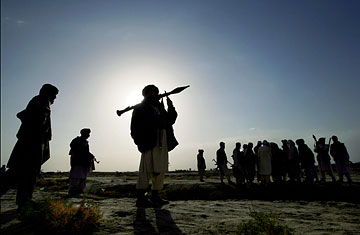
Armed men under the orders of Haji Baran, district commander of the Taliban in Ghazni province
While much of the focus on Tuesday's unveiling of President Obama's revamped Afghanistan strategy will be on the number of U.S. troops he's expected to send, that decision is really a sideshow to the critical battle now under way on the ground. Far more important to prospects of victory in Afghanistan is jump-starting a moribund effort to woo nonideological Taliban fighters to switch sides in exchange for paying jobs. Pentagon officials are hoping to repeat the success of similar tactics in Iraq.
U.S. military leaders have argued for years that the war against the Taliban won't be won on the battlefield but in changing the conditions that prompt young men to fight in its ranks. That makes U.S. reinforcements merely part — and not the most important part — of the retooled U.S. strategy Obama will announce Tuesday at the U.S. Military Academy. (The choice of venue is a sign that Obama is likely to give his Afghan commander, General Stanley McChrystal, West Point '76, nearly all the 40,000 extra troops he is seeking.)
Last month, Congress appropriated $1.3 billion in so-called Commander's Emergency Response Program (CERP) money for Afghanistan and Iraq. Generally reserved for development projects, Congress said such funds could be used for the "reintegration into Afghan society" of Taliban fighters who have stopped fighting. What that means is that "economic Taliban" — those who fight for the $10-a-day wage paid by the insurgents — might be offered jobs as security guards or construction hands in exchange for similar pay and a guarantee of protection if they lay down their arms.
While Afghan President Hamid Karzai has sought for years to entice lower-level members of the Taliban to leave the insurgency, this latest effort marks the first time the U.S. and NATO have gotten behind the push. Some 8,000 Taliban have flipped under the Afghan-led program, according to the Kabul government, although the program has been riddled with allegations of corruption. The revamped version relies on tribal leaders, instead of the Afghan central government, to choose development programs that employ former Taliban.
"That's the most cost-effective way of fighting a war, basically getting another guy to come in and say, 'O.K., I'm not fighting anymore,'" Democratic Senator Jack Reed, a senior member of the Senate Armed Services Committee and Vietnam-era Army officer, noted recently. "There are already indications on the ground that there are some parts of the Taliban who are willing, for the right arrangement, to come in."
Even though the Afghan war began 18 months before the Iraq invasion, such a program was not adopted in Afghanistan because the war effort there suffered as the U.S. poured most of its resources into Iraq. "We're not very far down that road [of enticing the Taliban not to fight]," Admiral Mike Mullen said in September as the Armed Services Committee weighed his nomination for a second term as Chairman of the Joint Chiefs of Staff. "It has not been an area of focus."
Taliban leaders have derided the effort. "The mujahedin of the Islamic Emirate of Afghanistan are not mercenaries and employed gunmen like the armed men of the invaders and their surrogates," Mullah Brader Akhund, the second-ranking Taliban, said after Obama signed legislation creating the program. "This war will come to an end when all invaders leave our country and an Islamic government based on the aspirations of our people is formed in the country."
But Army General David Petraeus, who now oversees the wars in both Afghanistan and Iraq as chief of the U.S. Central Command, is a believer. He told Congress last year that his vaunted early 2007 surge of nearly 30,000 U.S. troops into Iraq only amplified Sunni efforts to bring an uneasy peace to the bloodied country. The so-called "awakening" actually "started before the surge, but then was very much enabled by the surge," Petraeus said in April 2008. "It started with a sheik in Anbar province coming to a brigade commander in Ramadi and saying back in October 2006, 'Would you support us if we turned our weapons on al-Qaeda instead of on you?'" Such words from elements of the 70% of the Taliban that U.S. intelligence estimates are nonideological, U.S. officials say, could turn the country around.
